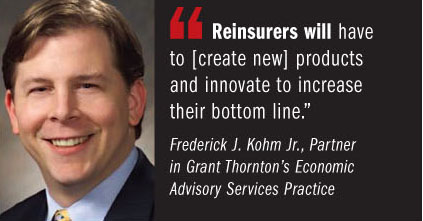The Bermuda reinsurance market has taken a beating after this year's string of catastrophes.
"The Bermuda market is predominantly a catastrophe-driven model—and you would expect that when there are catastrophes, it's Bermuda that will take a big chunk of that," says Julia Mather, head of advisory-service Miller Bermuda.
 After all, cats, she notes, are "the whole reason Bermuda is there. [Reinsurers] just have to hope their chunk isn't greater than they expected."
After all, cats, she notes, are "the whole reason Bermuda is there. [Reinsurers] just have to hope their chunk isn't greater than they expected."
Recommended For You
Want to continue reading?
Become a Free PropertyCasualty360 Digital Reader
Your access to unlimited PropertyCasualty360 content isn’t changing.
Once you are an ALM digital member, you’ll receive:
- Breaking insurance news and analysis, on-site and via our newsletters and custom alerts
- Weekly Insurance Speak podcast featuring exclusive interviews with industry leaders
- Educational webcasts, white papers, and ebooks from industry thought leaders
- Critical converage of the employee benefits and financial advisory markets on our other ALM sites, BenefitsPRO and ThinkAdvisor
Already have an account? Sign In Now
© 2025 ALM Global, LLC, All Rights Reserved. Request academic re-use from www.copyright.com. All other uses, submit a request to [email protected]. For more information visit Asset & Logo Licensing.








